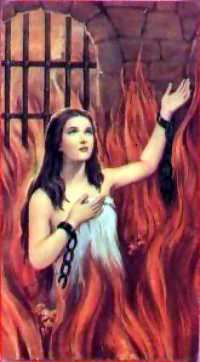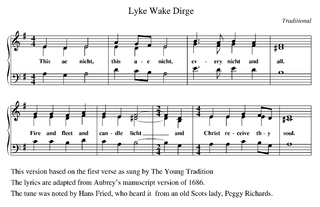Lyke-Wake Dirge
| "Lyke-Wake Dirge" | |
|---|---|
| Song | |
| Language | English (Yorkshire dialect) |
| Written | Unknown |
| Songwriter(s) | Unknown |
The "Lyke-Wake Dirge" is a traditional English song that tells of the soul's travel, and the hazards it faces, on its way from earth to purgatory. Though the song is from the Christian era and features references to Christianity much of the symbolism is thought to be of pre-Christian origin.[1][2][3][4]
The title
The title refers to the act of watching over the dead between the death and funeral, known as a wake. "Lyke" is an obsolete word meaning a corpse, and is related to the German word Leiche and the Dutch word lijk, which have the same meaning. It survives in modern English in the expression lychgate, the roofed gate at the entrance to a churchyard, where, in former times, a dead body was placed before burial, and the fictional undead monster type lich. "Lyke-wake" could also be from the Norse influence on the Yorkshire dialect: the contemporary Norwegian and Swedish words for "wake" are still "likvake" and "likvaka" respectively ("lik" and "vaka"/"vake" with the same meanings as previously described for "lyke" and "wake").
The lyrics
The song is written in an old form of the Yorkshire dialect of Northern English. It goes:

- THIS ae nighte, this ae nighte,
—Refrain: Every nighte and alle,
Fire and fleet and candle-lighte,
—Refrain: And Christe receive thy saule.
- When thou from hence away art past
To Whinny-muir thou com'st at last
- If ever thou gavest hosen and shoon,
Sit thee down and put them on;
- If hosen and shoon thou ne'er gav'st nane
The whinnes sall prick thee to the bare bane.
- From Whinny-muir when thou may'st pass,
To Brig o' Dread thou com'st at last;
- From Brig o' Dread when thou may'st pass,
To Purgatory fire thou com'st at last;
- If ever thou gavest meat or drink,
The fire sall never make thee shrink;
- If meat or drink thou ne'er gav'st nane,
The fire will burn thee to the bare bane;
- This ae nighte, this ae nighte,
—Every nighte and alle,
Fire and fleet and candle-lighte,
—And Christe receive thy saule.
- Note: ae: one; hosen: stockings; shoon: shoes; whinnes: thorns; bane: bone; brig: bridge
The safety and comfort of the soul in faring over the hazards it faces in the afterlife, are in the old ballad made contingent on the dead person's willingness in life to participate in charity. The poem was first collected by John Aubrey in 1686, who also recorded that it was being sung in 1616, but it is believed to be much older.
There would appear to be a lacuna in the version that Aubrey collected. Unlike the preceding and following pairs of stanzas, nothing happens at the Brig o' Dread. Richard Blakeborough, in his Wit, Character, Folklore, and Customs of the North Riding, fills this apparent gap with verses he says were in use in 1800, and which seem likely to be authentic:
- If ivver thoo gav o' thy siller an' gowd,
At t' Brig o' Dreead thoo'll finnd foothod,
- Bud if siller an' gowd thoo nivver gav nean,
Thoo'll doan, doon tum'le towards Hell fleames,
- Note: siller: silver; gowd: gold; foothod: foothold
In this version, the Brig o' Dread is the decisive ordeal that determines whether the soul's destination is Heaven or Hell.
This ballad was one of 25 traditional works included in Ballads Weird and Wonderful (1912) and illustrated by Vernon Hill.
The Whinny-muir of this tale also appears in The Well of the World's End as the "Muir o' Heckle-pins".[5]
Fire and fleet
Some versions of the words include fire and sleet rather than fire and fleet; the latter is in Aubrey's version of the words and in the Oxford Book of English Verse. F.W. Moorman, in his book on Yorkshire dialect poetry, explains that fleet means floor and references the OED.[6][7] He also notes that the expression Aboute the fyre upon flet appears in the mediaeval story Sir Gawain and the Green Knight and explains that "Fire and fleet and candle-light are a summary of the comforts of the house, which the dead person still enjoys for this ae night, and then goes out into the dark and cold."
Versions and performances

The poem has been recorded a number of times as a song. Arnold Bax set it for voice and piano in 1908 and made an orchestral version in 1934. Benjamin Britten set it to music as a part of his Serenade for Tenor, Horn and Strings in 1943, and, in his Cantata on Old English Texts of 1952, Igor Stravinsky uses individual verses as interludes between the longer movements. English composer Geoffrey Burgon wrote a duet (This Eane Night) for two countertenors (recorded by James Bowman and Charles Brett) with words altered slightly to fit the canonical single melody, the second countertenor starting one bar behind the first. At the end of each versicle the line rises by a semitone producing an eerie and climactic ending on top D before dropping back down to the starting tone.
A version with a different tune (but with the "fire and fleet" version of the lyrics) was collected by the folk song collector, Hans Fried, from the singing of "an old Scottish lady", Peggy Richards. The Young Tradition used this version for their a cappella recording on their 1965 debut album, using quite a primitive harmonisation, in which two of the vocal parts move in parallel fifths. The folk band Pentangle performed a version on their 1969 album Basket of Light, using the same tune as The Young Tradition, but elaborating the arrangement. Buffy Sainte-Marie also included this song on her 1967 album Fire & Fleet & Candlelight. Most later renditions of the song use the Richards-Fried melody; these include versions by Steeleye Span, the Mediaeval Baebes (titled 'This Ay Nicht') and Alasdair Roberts. The annual Spiral Dance in San Francisco has adapted the song to a neopagan context, changing the refrain to "May earth receive thy soul". This version can be found on Let It Begin Now: Music from the Spiral Dance.
Maddy Prior, writing in the liner notes to the Steeleye Span retrospective Spanning the Years, drily characterises the song's countercultural appeal, in describing one 1970s performance:
5 nights at the LA Forum with Jethro Tull. We were opening our set at the time with the Lyke Wake Dirge, a grim piece of music from Yorkshire concerning pergatory [sic] and we all dressed in dramatic mummers ribbons with tall hats. The effect was stunning. 5 gaunt figures in line across the front of the stage, lit from below casting huge shadows, intoning this insistent dirge alarmed some members of the audience whose reality was already tampered with by 1970s substances. It was most satisfying.
In the 2013 BBC radio play Neverwhere, the angel Islington (played by Benedict Cumberbatch) sang it.
In 2014, a version of the song was recorded by Matt Berninger and Andrew Bird for the soundtrack of the AMC series Turn.
"Lyke-Wake Dirge" is sometimes considered a ballad, but unlike a ballad it is lyric rather than narrative.
Allusions to the song
The Lyke Wake Walk is a 40-mile walking route across the North York Moors, first popularised in 1955 and named after the Lyke Wake Dirge.
The Lyke Wake Dirge was also invoked in
- Arnold Bax's 1908 never published song A Lyke-Wake (GP105) which he orchestrated in probably 1934
- Benjamin Britten's 1943 song cycle Serenade for Tenor, Horn and Strings. It serves as the lyrics for movement 5.
- Pamela Frankau's 1953 novel The Winged Horse. It is used to represent the imaginative world shared by the three children of a tyrannous newspaper tycoon and to presage the death of the son in an aviation accident.
- Antonia Forest's 1959 children's/young adult novel End of Term
- Gordon Dickson's 1962 science fiction novel Necromancer. In keeping with their philosophy of universal destruction, the Chantry Guild changes the second refrain from "And Christe receive thy saule" to "Destruction take thee alle".
- Arnold Wesker's 1962 play Chips with Everything
- Larry Niven and Jerry Pournelle's 1976 science fiction novel Inferno uses verses of the song
- Diana Wynne Jones's 1997 fantasy novel Deep Secret
- Kate Atkinson's 1998 mystery novel When Will There Be Good News?
- Neil Gaiman's 1999 fantasy novel Neverwhere
- The BBC's 2016 TV series The Living and the Dead. Used as the opening theme, performed by Howlin' Lord and The Insects.[8]
See also
| Wikimedia Commons has media related to Lyke-Wake Dirge. |
- Dirge – church service (office) for the dead, later somber funeral song
Notes
- ↑ The New Encyclopædia Britannica, Part 3, Volume 5, 1983. Page. 533
- ↑ Merriam-Webster's encyclopedia of world religions by Wendy Doniger, Merriam-Webster, 1999, ISBN 0-87779-044-2, ISBN 978-0-87779-044-0. Page 282.
- ↑ Gods and Myths of Northern Europe by Hilda Roderick Ellis Davidson, Penguin Books, 1964 Page. 231
- ↑ A glossary of the Cleveland dialect: explanatory, derivative, and critical by John Christopher Atkinson, J.R. Smith, 1868. Page. 601
- ↑ A Forgotten Heritage: Original Folk Tales of Lowland Scotland edited by Hannah Aitken, Scottish Academic Press, Edinburgh and London, 1973. Page 82
- ↑ "fleet". Oxford English Dictionary. Compact (2nd ed.). Oxford University Press. 1989. p. 1041. Variant or dialectal form of flet.
- ↑ Duntemann, Jeff. "Understanding "Lyke Wake Dirge"". duntemann.com. Retrieved 12 June 2015.
Some think the word is really "sleet," since the letters "f" and "s" in old writing can be easily confused....As best we can tell the song originated in Yorkshire, and people who have studied Yorkshire culture and dialect tell us that the word really is "fleet" with an "f". "Fleet" is an old word for a large room in a house, related to "flet" or floor. People who have read Tolkien may recall the Elvish platforms up in the trees in Lothlorien, which were called "flets" and were little more than floors surrounding the trunks of large trees. When "fleet" appears in English poetry, it is generally together with "fire" in the phrase "fire and fleet," to indicate the comforts of home. (Today we would say "hearth and home.")
- ↑ "The Living and the Dead". The Insects. Retrieved 19 July 2016.
References
- John Aubrey, Remaines of gentilisme and judaisme 1686–87. Reprinted in: John Buchanan-Brown (ed), Three prose works, Centaur Press, 1972. ISBN 0-900000-21-X
- F. W. Moorman, Yorkshire dialect poems: (1673–1915) and traditional poems, published for the Yorkshire Dialect Society by Sidgwick and Jackson, 1916.
- Richard Blakeborough, Wit, Character, Folklore, and Customs of the North Riding of Yorkshire, Henry Frowde: London, 1898.
- Alasdair Clayre, 100 folk songs and new songs, Wolfe Publishing Ltd, 1968. This includes the version collected by Hans Fried.
- Arthur Quiller-Couch (ed.), The Oxford Book of English Verse, Oxford: Clarendon Press, 1900
- First verse in 3-part harmony, based on the singing of The Young Tradition
- The Oxford English Dictionary includes fire and flet (corruptly fleet): 'fire and house-room'; an expression often occurring in wills, etc. and refers to an old northern song over a dead corps, but also notes the Fire and sleet version, with a quotation that sleet seems to be corrupted from selt, or salt, a quantity of which is frequently placed on the breast of a corpse.